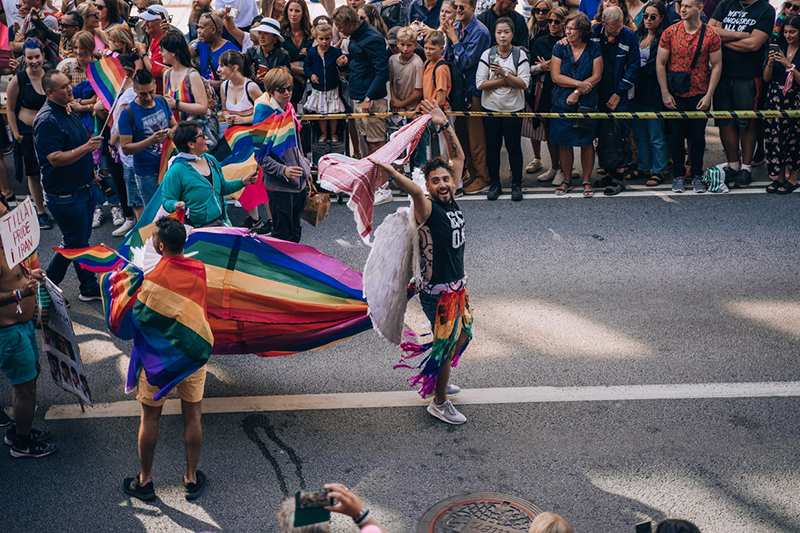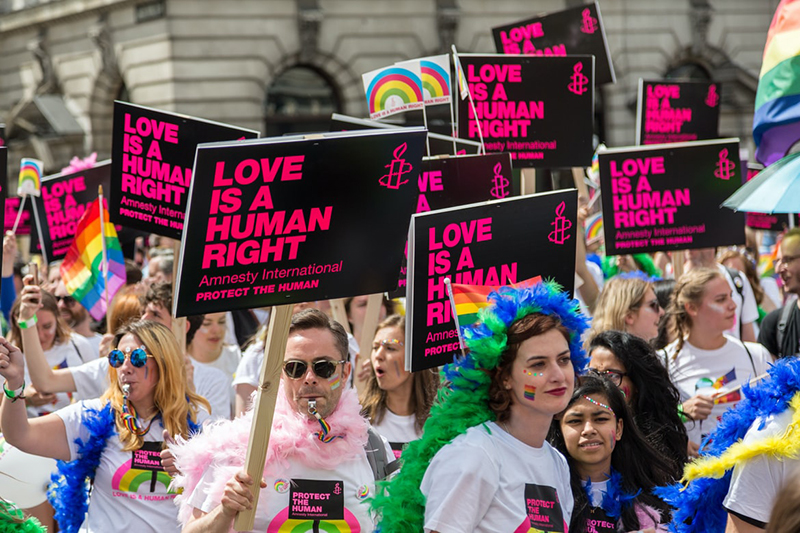 LGBTQI
LGBTQI Pride Month: Diplomatic missions in New Delhi join hands to support gay rights, release LGBTQI timeline
New Delhi/IBNS: Several diplomatic missions in New Delhi have joined hands in the Pride Month to reaffirm their commitment to promoting universal human rights of the LGBTQI people and their right to live with dignity in a violence free environment.
"This June, we the undersigned diplomatic missions in India’s capital, reaffirm our countries' strong commitment to promoting universal human rights and to ensuring that everyone, regardless of their gender identity or sexual orientation, enjoys these rights without discrimination," a media release from the Canadian High Commission said.
"Every year, our governments and our civil society work together to support, organize, or participate in a wide range of events to celebrate the diversity of our citizens, to combat violence, discrimination and misinformation against the LGBTQI+ community, to build on individual and collective achievements, and to highlight what needs to be done to ensure human dignity and equality for all human beings.
"Events are as diverse as the countries and communities that host them, but are often centered around IDAHOBIT day on May 17, LGBTQI+ Pride marches and events in June, and on Human Rights Day on December 10," it said.
This year, events organized by diplomatic missions in New Delhi include the lighting of embassies in the iconic colours of the LGBTQI+ rainbow flag, hoisting the rainbow flag on the embassies’ flagpoles, LGBTQI+ film screenings, panels, lectures, and outreach on social media.
"These diverse celebrations raise awareness about this important issue and foster a sense of community and belonging to advance human rights for all throughout the world. When all persons are protected on the basis of equality and with dignity, global stability is enhanced. We note with pride the increasing progress being made around the world to protect the human rights of LGBTQI+ individuals and have included a list of national and international achievements in the annex," it said.
"Of note this year, the COVID-19 pandemic has been particularly difficult for members of the LGBTQI+ community and we remain committed to working with our local partners to continue to create awareness and advocate for equal rights and opportunities for the community.
"We take this occasion to express our solidarity with the human rights defenders and civil society organizations working in India and around the world to uphold the fundamental freedoms of LGBTQI+ persons to live freely and with dignity," it said.
The signatories to the statement are:
Embassy of the Kingdom of Belgium, British High Commission, High Commission of Canada, The Embassy of the Czech Republic, Embassy of Estonia
Delegation of the European Union, Embassy of France, Embassy of the Federal Republic of Germany, Embassy of Israel, Embassy of Japan, Embassy of Mexico
New Zealand High Commission, Embassy of Spain, Embassy of the Republic of Slovenia, Embassy of Sweden, Embassy of Switzerland, Embassy of the United States of America
LGBTQI Timeline Through the Eyes of Diplomatic Missions:
- In 1791, France becomes the first West European country to decriminalize homosexual acts between consenting adults, followed by the Netherlands in 1811, Brazil in 1830, Portugal in 1852, the Ottoman Empire in 1858, Guatemala and Mexico in 1867, Japan in 1880 and more than a hundred countries in the 20th century, including India on 6 September 2018, with the reading down by the Supreme Court of India of Section 377 of the Indian Penal Code, decriminalizing same-sex relations between consenting adults.
- In 1867, Karl Heinrich Ulrichs becomes the first self-proclaimed homosexual to speak out publicly for homosexual rights when he pleads at the Congress of German Jurists in Munich for a resolution urging the repeal of anti-homosexual laws.
- Literature, and later theater and cinema, gradually increase visibility of the LGBTQI+ community and its acceptance: in 1895, at the same time Oscar Wilde is sentenced to two years hard labor in prison for "gross indecency," the novel "Bom-Crioulo" is published in Brazil with homosexuality at its center and with a black man as the story's hero. In 1913, Marcel Proust publishes "In Search of Lost Time" in France marking the first time a modern Western author writes about homosexuality. In 1919, "Different From the Others," a German-made film, is one of the first explicitly gay films. Throughout the 20th century, and increasingly around the world, numerous intellectuals and cultural figures come out as LGBTQI+.

- After the Second World War, the rate of countries decriminalizing homosexual acts between consenting adults grows, organizations defending LBGTQI+ rights are created, and publications on the subject grow.
- In 1969, LGBTQI+ people spontaneously fight back against police raids at the Stonewall Inn bar in New York City, starting days of riots. To commemorate the Stonewall Uprising, queer Americans organize the first pride marches in cities across the United States, which countries around the world begin to emulate. In 1973, a mother of a gay son in New York City establishes PFLAG, which stands for parents and family of lesbians and gays, to increase understanding and support for parents and their queer children. PFLAG becomes one of the first large-scale organizations of straight people defending LBGTQI+ rights.
- The American Psychiatric Association (APA), the largest psychiatric association in the world, makes history in 1973 by removing same-sex sexual attraction from the manual of mental illnesses. Gradually through the 1970s, due in part to the activism that continued following the Stonewall Uprising and the APA’s decision, medical and psychiatric associations around the world stop listing homosexuality as a mental illness, and in 1981, is removed from the national classification of diseased in Finland. This culminates in 1990 with a formal decision of the World Health Organization.
- Starting in the 1990s, openly gay/lesbian candidates win elections in local assemblies, parliaments, city halls, and in some cases reach the head of State and Government. The United Kingdom has the highest number of openly gay, lesbian and bisexual parliamentarians in the world, with more than 30 Members of Parliament from across the political spectrum.
- In 1994, Israel legislates a constitutional law prohibiting discrimination on the basis of sexual orientation. The law’s constitutional status automatically applies the prohibition to all governmental and religious bodies in Israel, and is later expanded to include the public sector including private businesses. The Israeli coastal city of Tel Aviv booms as the travel destination for the LGBTQI+ community in the region.
- In 1972 Sweden becomes the first country in the world to legally allow gender change, and in 1989, Denmark is the first country in the world to enact registered partnership laws (similar to civil unions) for same-sex couples, with most of the same rights as married couples. U.S. cities like San Francisco (1989), the District of Columbia (1992) also passed such legislation. Many other cities, states, and countries soon follow suit.
- In 2001, the Netherlands becomes the first country to legalize same-sex marriage, marking a shift in tide for the recognition of equal rights of LGBTQI+ people around the world. In recent years on the 17th of May, The Netherlands Embassy has organized events in New Delhi on LGBTQI+ issues with the community. The Netherlands and Uruguay, organized an international LGBTQI+ conference in Montevideo on 13-15 July 2016 where more than 200 countries and organisations participated.

- During this conference, the Equal Rights Coalition (ERC) was established with 33 members, with the Netherlands and Uruguay as the first co-chairs. The ERC, which now counts 42 member States, is the first ever inter-governmental body focused explicitly on advancing LGBTI human rights and inclusive development.
- In 2003 Belgium became the second country in the world to legalize same-sex marriage, before granting same-sex couples the right to adoption in 2006. Belgium also introduced legal protection against discrimination based on sexual orientation in 2003, which was expanded to gender identity and gender expression in 2014, as well as intersex status in 2020.
- Canada performs the first legally recognized same-sex marriage in 2001, before the government became the first country in the Americas to legalize it nationwide in 2005, the same year in which Spain legalizes same-sex marriage. South Africa follows suit in 2006 and becomes the first African country to extend full marriage rights. Argentina, in 2010, becomes the first Latin American country to approve same sex marriage, and in 2012, becomes a pioneer worldwide in passing a gender identity law. Brazil, besides being an important sponsor of initiatives for LGBTQI+ rights in the United Nations, legalizes same-sex civil unions and marriages in 2011.
- In 2013, Australia introduces new legal protections against discrimination on the basis of sexual orientation, gender identity, and intersex status. This legal reform is recognized as world-leading with Australia becoming one of the first countries globally to specifically protect intersex persons from discrimination.
- Many countries legalize same-sex marriage, Mexico in 2009, Portugal in 2010, France and New Zealand in 2013 Great Britain Finland and Luxemburg in 2014. The Equal Marriage Law, passed by the Finnish parliament, is the first citizens’ initiative approved. In 2015, Chile enacts the family status of "Civil Partner" through the enforcement of the Civil Partnership Agreements. In May of 2015 Ireland holds a referendum on marriage equality and becomes the first country in the world to legalize same-sex marriage by popular vote. One month later, in June 2015, the United States Supreme Court rules to legalize same-sex marriage. After Colombia in 2016, and Finland Malta and Germany in 2017, Australia becomes the 26th country and second nation in Oceania to legalize same-sex marriage when the Australian Parliament passes a bill in December 2017.

- Third gender rights have been led mostly by Asia. In 2007, Nepal becomes what is believed to be the world's first country to include a third gender option on its census forms. India has long recognized a community of five to six million third gender Indians as citizens who do not identify themselves as either male or female. In India in 2009, the nation's election authorities decide to formally allow an independent designation for intersex or transgender voters and in April 2014 the Indian Supreme Court issues a landmark judgment granting transgender people legal recognition and access to “all rights under the law”. In 2009, the Chief Justice of Pakistan orders the National Database and Registration Authority to issue national identity cards with a third gender category for non-binary citizens. In November 2013, the Bangladesh Government announces the recognition of the third gender category in all national documents and passports.
- In June 2017, the Government of Canada passes legislation that protects transgender and other gender-diverse persons against discrimination, hate crimes and hate propaganda by adding gender identity or expression to existing lists of protected grounds in the Canadian Human Rights Act and the Criminal Code. In November 2017, Prime Minister Justin Trudeau apologizes for past federal legislation, policies and practices that facilitated systemic discrimination against and persecution of Canadians based on their sexual orientation, gender identity or gender expression. In January 2022, Canada introduces legislation banning co-called conversion therapy, making it a crime to provide or promote services intended to change or repress a person’s sexual orientation or gender identity. In April 2022, Canada lifts a ban on blood donations from men who have sex with men.
- Today, an increasing number of heads of government in the world, as well as numerous politicians or personalities, are members of the LGBTQI+ community.
Support Our Journalism
We cannot do without you.. your contribution supports unbiased journalism
IBNS is not driven by any ism- not wokeism, not racism, not skewed secularism, not hyper right-wing or left liberal ideals, nor by any hardline religious beliefs or hyper nationalism. We want to serve you good old objective news, as they are. We do not judge or preach. We let people decide for themselves. We only try to present factual and well-sourced news.







